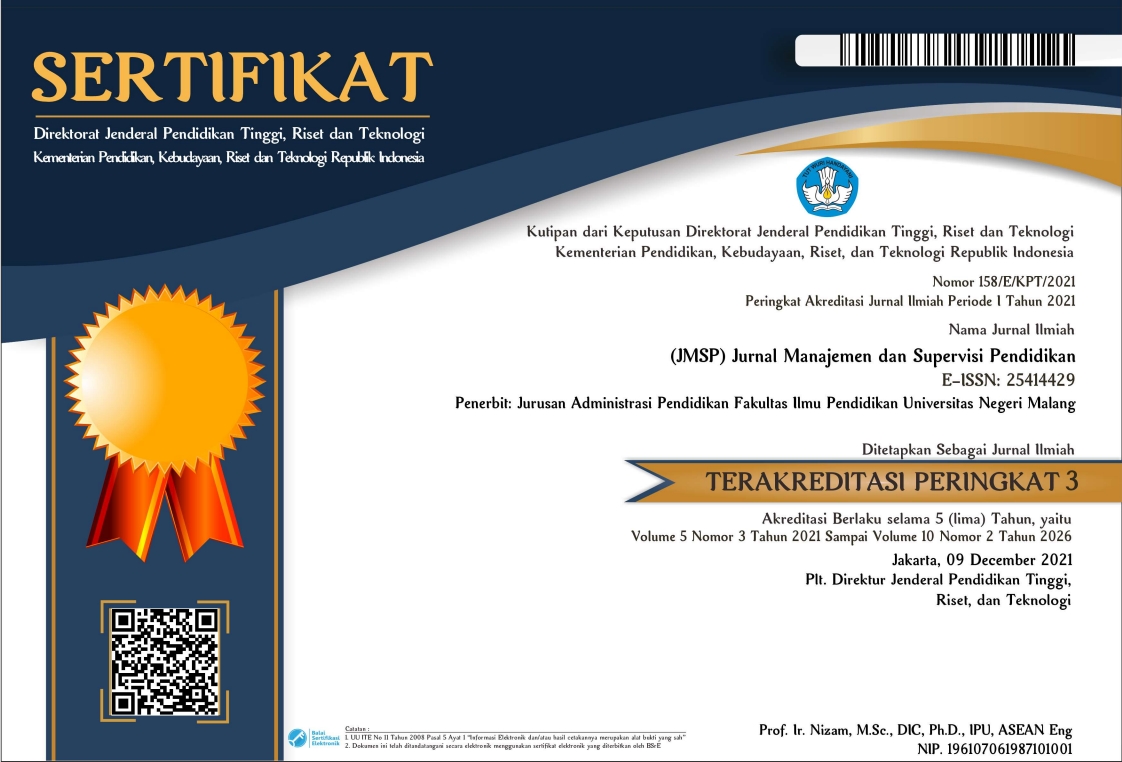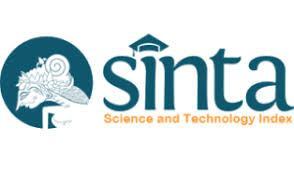Evaluating the Usability of Moodle-based Learning Management System Application in Faculty of Engineering UNSIKA Using USE Questionnaire
Abstract
Keywords
Full Text:
PDFReferences
Asnawi, N. (2018) ‘Pengukuran Usability Aplikasi Google Classroom Sebagai E-learning Menggunakan USE Questionnaire (Studi Kasus: Prodi Sistem Informasi UNIPMA)’, RESEARCH : Computer, Information System & Technology Management, 1(1), p. 17. Available at: https://doi.org/10.25273/research.v1i1.2451.
Banggur, M.D.V., Situmorang, R. and Rusmono, R. (2018) ‘Pengembangan Pembelajaran Berbasis Blended Learning Pada Mata Pelajaran Etimologi Multimedia’, JTP - Jurnal Teknologi Pendidikan, 20(2), pp. 152–165. Available at: https://doi.org/10.21009/jtp.v20i2.8629.
Choudhury, H. and Khataniar, D.G. (2016) ‘Features Based Comparison and Evaluation of E-learning Platform in Academic Environment’, in Dantas, C. et al. (2017) ‘European Portuguese Validation of Usefulness, Satisfaction and Ease of Use Questionnaire (USE)’, in WorldCIST.
Gao, M., Kortum, P. and Oswald, F. (2018) ‘Psychometric Evaluation of the USE (Usefulness, Satisfaction, and Ease of use) Questionnaire for Reliability and Validity’, Proceedings of the Human Factors and Ergonomics Society Annual Meeting, 62(1), pp. 1414–1418. Available at: https://doi.org/10.1177/1541931218621322.
Hardyanto, W., Purwinarko, A. and Adhi, M.A. (2018) ‘End-user satisfaction analysis on library management system units using technology acceptance model towards the national standard of integrated library’, Journal of Physics: Conference Series, 983, p. 012006. Available at: https://doi.org/10.1088/1742-6596/983/1/012006.
Hasan, K., Zainal, Z. and Suhadjerah, S. (2020) ‘The Development of Learning Media of Pakakala Boardgame’, Journal of Educational Science and Technology (EST), pp. 48–55. Available at: https://doi.org/10.26858/est.v6i1.12351.
Ita, E. (2023) ‘Problems of Implementing Online Learning for Teachers, Parents, and Students During the Covid-19 Pandemic’, Jurnal Manajemen dan Supervisi Pendidikan, 7(2), pp. 72–78.
Jannah, S.N., Sobandi, A. and Suwatno, S. (2020) ‘The Measurement of Usability Using USE Questionnaire on the Google Classroom Application as E-learning Media (A Case study: SMK Negeri 1 Bandung)’, Teknodika, 18(2), p. 94. Available at: https://doi.org/10.20961/teknodika.v18i2.42486.
Jawad Soumik, M.M. et al. (2019) ‘Employing Machine Learning Techniques on Sentiment Analysis of Google Play Store Bangla Reviews’, in 2019 22nd International Conference on Computer and Information Technology (ICCIT). IEEE, pp. 1–5. Available at: https://doi.org/10.1109/ICCIT48885.2019.9038348.
Lawson-Body, A. et al. (2017) ‘Developing and Validating a Cultural User Satisfaction Instrument in Developing Countries’, Journal of Computer Information Systems, 57(4), pp. 319–329. Available at: https://doi.org/10.1080/08874417.2016.1232977.
Muijs, D. (2011) ‘Doing Quantitative Research in Education with SPSS’. London. Available at: https://doi.org/10.4135/9781446287989.
Oktavia, R. et al. (2018) ‘Assessing the validity and reliability of questionnaires on the implementation of Indonesian curriculum K-13 in STEM education’, Journal of Physics: Conference Series, 1088. Available at: https://doi.org/10.1088/1742-6596/1088/1/012014.
Purwinarko, A., Subagja, M. and Yanuarto, A. (2020) ‘The Evaluation of Final Assignment System Using the USE Questionnaire Approach’, Scientific Journal of Informatics, 7(2), pp. 2407–7658. Available at: http://journal.unnes.ac.id/nju/index.php/sji.
Puspitasari, N. et al. (2019) ‘Website Testing Analysis Using PIECES and EUCS Method’, in 2019 International Conference on Electrical, Electronics and Information Engineering (ICEEIE). IEEE, pp. 298–302. Available at: https://doi.org/10.1109/ICEEIE47180.2019.8981417.
Saad, S., Carter, G.W., Rothenberg, M., and Israelson, E. (1999) ‘Testing and Assessment: An employer’s guide to good practices’, Employment and Training Administration, p. 80. Available at:http://uniformguidelines.com/uniguideprint.html%5Cnhttp://eric.ed.gov/?id=ED447310%5Cnhttp://www.uniformguidelines.com/testassess.pdf.
Sari, I.K. (2021) ‘Blended Learning sebagai Alternatif Model Pembelajaran Inovatif di Masa Post-Pandemi di Sekolah Dasar’, Jurnal Basicedu, 5(4), pp. 2156–2163. Available at: https://doi.org/10.31004/basicedu.v5i4.1137.
Sujito, F., Arifudin, R. and Arini, F. (2019) ‘An Analysis of User Interface and User Experience Using System Usability Scale and GOMS Method’, Journal of Advances in Information Systems and Technology, 1(1 SEArticles). Available at: https://doi.org/10.15294/jaist.v1i1.36503.
Taherdoost, H. (2018) ‘Validity and Reliability of the Research Instrument; How to Test the Validation of a Questionnaire/Survey in a Research’, SSRN Electronic Journal, 5(3), pp. 28–36. Available at: https://doi.org/10.2139/ssrn.3205040.
Wahid, A. (2015) ‘Pelatihan dan Penerapan E-Learning dan M-Learning Berbasisi Moodle bagi Guru Siswa SMK Persada dan Bajiminasa Makassar’, Jurnal Inovasi dan Teknologi Pembelajaran, pp. 102–107.
Yunis, R. and Telaumbanua, K. (2017) ‘Pengembangan E-Learning Berbasiskan LMS untuk Sekolah, Studi Kasus SMA/SMK di Sumatera Utara’, Jurnal Nasional Teknik Elektro dan Teknologi Informasi (JNTETI), 6(1). Available at: https://doi.org/10.22146/jnteti.v6i1.291.
Yusliani, E. (2022) ‘Validity and Reliability of Critical Thinking Instruments to Measure the Effectiveness of Context-Based Physics E- Module on Wave Materials’, 8(1), pp. 57–64. Available at: file:///C:/Users/teguh/Downloads/27178-Article Text-75972-1-10-20220712.pdf.
DOI: http://dx.doi.org/10.17977/um025v7i32023p131
Refbacks
- There are currently no refbacks.
Copyright (c) 2023 JMSP (Jurnal Manajemen dan Supervisi Pendidikan)

This work is licensed under a Creative Commons Attribution 4.0 International License.









